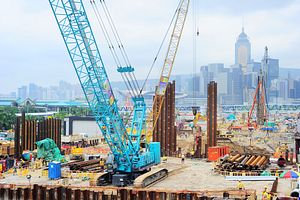Australia apparently will not join the new Asian Infrastructure Investment Bank (AIIB), because of strategic conflicts. The China-led development bank will give Asian nations loans for infrastructure, something sorely needed in much of the region. Australia’s reason for pulling out so suddenly has to do with U.S. and Japanese pressure, apparently. News came just as the APEC summit in Beijing was getting underway.
There are worries about Chinese dominance of the bank, although commentators have been swift to point out that China’s large share would be decreased by Australian membership, thus making government claims of Beijing’s undue influence a little hollow. Whilst the U.S. and Japan obviously want Australia to stay committed to the World Bank and the Asian Development Bank (ABD), there are arguments that the game need not be zero-sum (to quote U.S. President Barack Obama’s APEC speech on a rising China). Of course, alliance-wise it need not be but Australia has become more parsimonious with its aid of late, placing the AusAid program under the aegis of the Department of Foreign Affairs and Trade last year in a move that upset many. Will it want to make a substantial contribution to another development bank?
Writing for Fairfax media, Peter Reith, a former Coalition government minister, believes that the AIIB will wind up as an inefficient, bureaucratic gravy train similar to the European Bank for Reconstruction and Development, which was “more like a meeting of the United Nations than a meeting of a bank” and where he spent six years. Reith says he also spent considerable time closely following the European Infrastructure Bank, which China admires as a model for its own. Under former Prime Minister Kevin Rudd, Australia was more keen to be involved in such projects, even the African Development Bank, partly as a way to get a seat on the Security Council.
As other commentators have pointed out, there are worries of China gaining strategic influence in nations that default on their loans. Could China compel nations to cooperate militarily? What about the soft power influence of an influx of Chinese money? The latter claim may hold more weight but China hardly needs a whole new multinational bank going up against the Asian Development Bank for this: It is already financing large projects around the world, from Africa to Southeast Asia. For some years now there have been worries about undue Chinese influence in Laos, strong enough that even the small and tightly controlled state media of Laos has voiced concerns. China and Vietnam built the stadiums in Vientiane for the 2009 Southeast Asian Games, and plans to bring in 50,000 Chinese workers were met with strong local opposition. China has already provided the small nation with hundreds of millions in development aid. Obviously this has not been publicly and notionally conditional upon more democracy, transparency, or better human rights.
In a way this latest move seems emblematic of Australia’s confused China stance. A free trade agreement has been negotiated now for close to a decade and the Abbott government hopes desperately to have it in the bag very soon. As reported here last week a purported billion-dollar cattle deal with China was joyfully announced by the government. Yet commitments outside of trade or doing anything to jeopardize the close U.S.-Australia alliance leave many in the government on edge, it seems. Of course, these jitters seem at odds with Australia’s 2012 White Paper “Australia in the Asian Century,” of which the ambassador to China said, “The White Paper sets out Australia’s constructive and forward-looking attitude to Asian engagement, particularly with China. It clearly states that Australia supports China’s participation in the region’s strategic, political and economic development.” As long as China stays within the current system, it would seem.
Helen Clark was based in Hanoi for six years as a reporter and magazine editor. She has written for two dozen publications including The Diplomat (as Bridget O’Flaherty), Time, The Economist, the Asia Times Online and the Australian Associated Press.

































